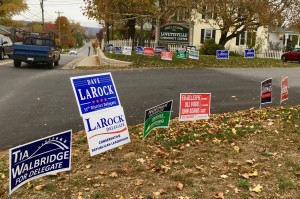 Hardly a person fails to follow the polls to consider the trend of opinion approaching the day of election.
Hardly a person fails to follow the polls to consider the trend of opinion approaching the day of election.
In Virginia that appeared to favor Republican Gubernatorial Candidate Edward Gillespie closing in on his Democratic opponent.
There was a pol that had Mr. Gillespie’s opponent, Democratic Gubernatorial Candidate Ralph Northam, with a 13-point lead in September, then a 6-point lead weeks ago, and a 2-point lead the weekend before the election.
There was much concerned talk among Dems and joyfully anxious conversation among Republicans.
As they went from polling place to polling place on the day of the election, many wondered if Northam might be the only member of the Democratic slate left standing by election night.
This seeming trend toward a narrow victory for Northam augured badly for down ticket Dems who rely on the tail of the statewide ticket to pull them over the electoral finish line.
Polls and pundits, however, were astonished at the results several hours after 7PM when the precincts across the state closed and began reporting their results.
The trends were nothing like all the prognostications of experienced statisticians and those “who know, really know, politics.”
The Democratic slate won easily, and there’s a chance that the Republicans may lose control of the lower house of the General Assembly.
One voter said afterwards, “I don’t like Northam. Don’t interrupt. I want to talk. I had no intention of voting for him. But I saw this tv ad that said released felons were allowed to have guns, so I checked the executive order and found that charge was false, and I really resented another charge on this endlessly looping tv ad that a pediatrician, Northam, caused harm to children. I just didn’t believe it, thought it was so lacking in dignity and fair play, so I voted for Northam. I told a poll watcher when I arrived to vote, and I spoke very politely, that she should encourage her leaders to make a course correction.”
After the election, another voter, catching a cappuccino, turned on the line, and said proudly, “We women made the critical difference in the election.”
“This goes back to the Women’s march,” she said, “and I want our grand-children to understand how important that was.”
There’s a lot of truth in what this voter said about women voting, as the Washington Post exit polls reported that 61% of women voted for Mr. Northam, and 77% of unmarried women preferred Mr. Northam.
22% more women voted for Mr. Northam than for Mr. Gillespie, and that was greater than Hillary Clinton’s 17 point margin over Mr. Trump last year.
As for the younger voters, and this is something to watch in prospective elections, 60% voted for Mr. Northam.
When you consider the question of bias and diversity, 87% of blacks and 67% of Hispanics voted for Mr. Northam. That’s an electoral deficit that can only get worse for Republicans, with shifting and increasing demographics for these groups, if the xenophobic bashing and racial bias continues to occupy a prominent position in the Republican campaign tool box, with or without dog whistle signals.
60% of college-educated voters preferred Mr. Northam. Thomas Jefferson once said, “A nation that expects to be ignorant and free expects what never was and never will be.”
20% of the voters, according to the polls, made up their minds in the final week before the election. Suspicions abound among voters about the reliability of what is said in the closing days of any campaign. There’s a fear of reckless exaggeration. There appears to have been a well-recognized excess in this election.
The wedge issues that were pumped onto tv and print and social media relating to immigration and confederate statues and the like prompted many voters to recoil, seemingly more than those who were persuaded.
While off year elections are usually low turnout, this election appeared to be a release for the dissatisfaction voters felt, perhaps since the presidential election a year ago.
There was a spike among the issues that prompted many to vote for Mr. Northam and it was Health Care. 77% of those who voted for Mr. Northam were concerned about health care, and that consisted of 39% of those voting on election day. The discussions about the ACA on a national level, and Medicaid on the state level plainly made a difference when the voters were pulling the levers.
There has been a lot of discussion about how Mr. Trump was the big loser in this election. A more detailed way to break out that discussion, and evaluate the truth of the matter, is to scrutinize the method and content of electoral advocacy, to the extent, it followed Mr. Trump’s demeaning aspects and his campaign policy stands on everything from immigration, to “national monuments,” to women and plainly Virginia preferred another direction.
Jefferson was of the view that, “Should things go wrong at any time, the people will set them to the right by the peaceable exercise of their elective rights.”
Currently, many voters and those pundits say that’s what happened in the most recent election.
